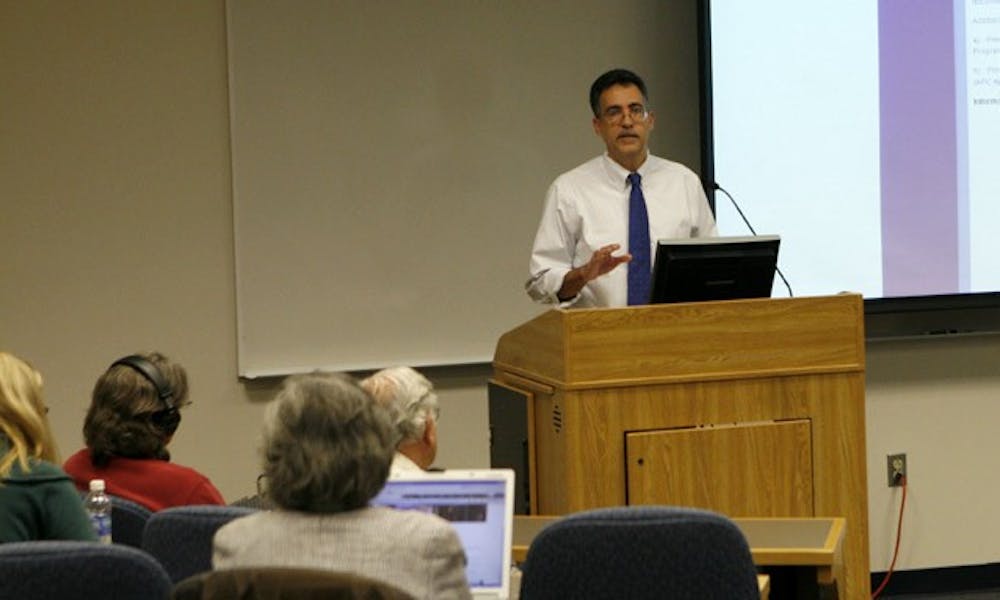Professors and administrators took part in at-times heated debate about the state of the athletics department budget Thursday afternoon at the Academic Council meeting.
Michael Gillespie, chair of the Athletic Council Committee and Jerry G. and Patricia Crawford Hubbard professor of political science, presented a summary of the athletics budget, including a breakdown of the department’s revenues and losses. The University currently provides a subsidy of $14.6 million to the department, down from $15 million last year.
During the committee presentation, Gillespie mentioned plans for the creation of a new field house, which prompted mathematics professor Richard Hain to raise his objections.
“Why do we need a field house? We’re not in a place like Wisconsin where it is freezing outside,” Hain said. “There are a lot things people need that are central to the goals of the University and they’re not getting them. Various long-term employees are losing their jobs and Arts and Sciences are being asked to cut $100,000 in each department, yet the athletics department is growing at a staggering rate.”
Academic Council Chair Craig Henriquez, professor of biomedical engineering and co-director of the Center for Neuroengineering, said the athletic department makes the money it needs to operate, except for the University subsidy. He added that concerns are only raised in lean times, when the University is trying to cut its budget.
According to the Department of Athletics’ 2008 strategic plan, “Unrivaled Ambition,” however, expenses have exceeded revenue for the department for many years. Currently, the department is attempting to balance a $60.3 million budget, convening an Executive Budget Committee to rein in costs. As of November, they had been able to cut 5 percent of expenses.
“All units are struggling to make their budgets,” Henriquez said. “This isn’t specific to the athletic department. Part of it is that they are outside of academics, they’re visible and as a result, an easy target. There are a few in athletics making lots of money and so it’s one place people go after when they’re trying to decide what is good for the University.”
Still, Hain said the structure and role of the athletics department needs to be revisited.
“Some people see [the athletics department] as a big goose that lays golden eggs. That’s not the way it works,” Hain said. “Coach [Mike Krzyzewski]’s salary has doubled in the last couple of years. I’m wondering how much retaining [head football coach David Cutcliffe] is going to cost us.”
Executive Vice President Tallman Trask responded that negotiations with Cutcliffe were still underway, but that it appeared keeping him at Duke was not going to cost more. Last week, Cutcliffe turned down the head coaching position at the University of Tennessee to keep coaching the Blue Devils. Coaching salaries, however, were still a controversial topic.
“There are contracts that the University gets only because we have Coach K,” Henriquez said. “It’s because of Coach K that money flows into the University that is then used to pay him.... Coaches have developed celebrity personas. 30 years ago we had a coach who made the equivalent of a faculty member and now we have one that make 10 times what the average faculty member makes.”
Hain noted that it was difficult to understand budgetary decisions the athletics department makes because the information is scarce and that he would like the information to be posted online or sent to members yearly. Trask responded that there was “no mystery here” and handed Hain a breakdown of the internal audit information.
“It’s a difficult thing to work through because this is our University,” Henriquez said. “We want this University to be highly-regarded and well-received so we don’t want to put information out there that is going to be incorrect or used against us, because it will be used against us, but at the same time we want to understand it.”
In addition to Gillespie’s presentation, chairs of the Faculty Athletic Associate program—created to facilitate communication between coaches and faculty members—presented an update and discussed their attempts to increase its effectiveness.
“This last year we tried to get a sense of what was working and what wasn’t working,” said co-Chair Suzanne Shanahan, an associate research professor in sociology. “In some instances there were good relationships formed between faculty and coaches, but that was more of the exception than the norm.”
In other business:
Jeff Glass, senior associate dean for education for the Pratt School of Engineering, presented a proposal for a new Masters of Engineering program.
Some professors expressed concerns that the new degree would detract from the quality of students admitted and instead focus on acquiring more revenue. The proposal will be voted on at the Academic Council meeting next month.
Get The Chronicle straight to your inbox
Signup for our weekly newsletter. Cancel at any time.

